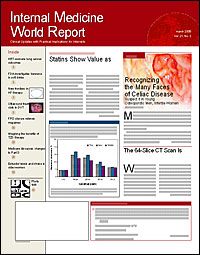Publication
Article
Internal Medicine World Report
From the International Stroke Conference Statins Show Value as Ischemic Stroke Therapy
Author(s):
Kissimmee, Fla?New studies show that statins appear to have a protective effect in patients with ischemic stroke injury.
In a study presented at the American Stroke Association's International Stroke Conference 2006, statin pretreatment in patients who suffered a first-ever ischemic stroke cut the risk of stroke progression in half. Other studies showed that using statins decreased in-hospital mortality and that withdrawing statins during the acute phase of a stroke increased the risks of a poor neurologic outcome.
Data showing that statin treatment before stroke onset offered protection against stroke progression were reported by Atsushi Shiraishi, MD, of the Tokyo Medical and Dental University, and colleagues.
Some 523 first-ever stroke patients were evaluated within 48 hours of stroke onset. Stroke progression, defined as a worsening of >2 points on the National Institutes of Health Stroke Scale or death, occurred in 7 of 64 (10.9%) patients taking a statin before their stroke compared with 108 of 459 (23.5%) who did not take a statin before their stroke (P = .027).
After multivariable adjustment, statin pretreatment remained a significant factor in preventing stroke progression (hazard ratio, 0.45; P = .04). The benefit of statin pretreatment appeared greatest in patients with large-artery atherosclerosis, although the sample size was too small to draw definitive conclusions. The investigators suggest that randomized controlled trials are needed to assess the role of statins in acute stroke therapy.
Another study, a retrospective chart review, found that patients who used lipid-lowering agents, most often statins, within 48 hours of admission had reduced in-hospital mortality and stroke severity following acute ischemic stroke compared with patients who did not use such agents, said Norina Allen, MPH, a doctoral candidate at Yale University, New Haven, Conn.
A review of charts from 1256 stroke patients revealed an in-hospital mortality of 5.3% among patients not taking lipid-lowering agents compared with 1% in patients taking lipid-lowering ther?apy?a reduction of 82% in in-hospital mortality (Table). Furthe?r?more, more patients taking lipid-lowering medications had mild events and fewer had severe events compared with those not taking antidyslipidemia medications.
In other data presented at the meeting, statin withdrawal in the acute phase of stroke increased the likelihood of worse strokes and a poor neurologic outcome, said Florentino Nombela, MD, of the University Hospital de la Princesa, Madrid, Spain.
"The statin withdrawal syndrome can play a negative role that must not be forgotten when managing patients in the acute phase of ischemic stroke," he said.
His study included 215 patients with acute ischemic stroke, 89 of whom were receiving statin therapy up to the time of their stroke. These 89 patients were randomized to either statin withdrawal during the first 3 days or continued drug therapy. A third group of 126 patients who were not taking a statin at the time of their stroke served as controls. All patients received a statin after day 3.
Early neurologic deterioration, defined as a decrease of >=4 points on the National Institutes of Health Stroke Scale within the first 48 hours of hospital admission, occurred in 65.2% of patients who had statins withdrawn on admission compared with 20.9% who continued to take statins. In the control group, 27% experienced early neurologic deterioration.
Scores of >=2 points on the modified Rankin scale at 3 months were observed in 58.7% of patients who had their statin withdrawn, 37.2% of those who continued taking a statin, and 42.1% of the controls.
Infarct volume at days 4 through 7 increased by a mean of 74 cc in the group in whom statins were withdrawn com?pared with 26 cc in the group that continued taking statins and 53 cc in the group that was not taking a statin at admission.





